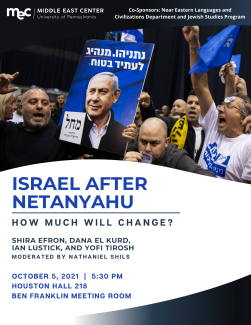Event

Israel After Netanyahu: How Much Will Change?: A Panel Discussion
Shira Efron, Dana El Kurd, Ian Lustick, Yofi Tirosh, and moderator Nathaniel Shils
After 15 years as prime minister of Israel, including a three-year stint in the 1990's Binyamin Netanyahu went down in history as that country's longest-serving leader — fundamentally transforming Israel's domestic politics, its relations with the US, and what little remained of the Arab-Israeli peace process. As Israel embarks on a new chapter, led by an unlikely coalition under the premiership of Naftali Bennett, we ask what comes next.
Shira Efron is a senior research fellow at the Institute for National Security Studies (INSS) in Tel Aviv, a Special Advisor on Israel with the RAND Corporation, and an Adjunct Scholar at the Modern war Institute (MWI) at West Point. Her research focus is U.S. policy toward the Middle East, including on Israel’s evolving ties with China and the Israeli-Arab conflict, and the nexus between climate change and national security. She has a Ph.D. and M.Phil. in policy analysis from RAND’s Graduate School and an M.A. in international relations/international business from New York University (NYU).
Dana El Kurd received her PhD in Government from The University of Texas at Austin in June 2017. She specializes in Comparative Politics and International Relations, with a focus on conflicts between states and their societies, authoritarianism and external intervention, and the societal impact of authoritarian rule on political engagement. She is the author of Polarized and Demobilized: Legacies of Authoritarianism in Palestine (Oxford University Press, 2020). She has written for such publications as Foreign Affairs, The Washington Post, and the Journal of Global Security Studies.
Ian Lustick held the Bess W. Heyman Chair and taught Political Science at Penn until 2021, with a focus on Middle Eastern politics, comparative politics, and computer modeling. His research focuses on the implications of the disappearance of the option of a negotiated “two-state solution” to the Israeli-Palestinian conflict and techniques of counterfactual forecasting. He is a past president of the Politics and History Section of the American Political Science Association and of the Association for Israel Studies, and a member of the Council on Foreign Relations. Among his books are Arabs in the Jewish State (1980); For the Land and the Lord (1988, 1994); Unsettled States, Disputed Lands (1993); Trapped in the War on Terror (2006); and Paradigm Lost (2019).
Yofi Tirosh is an Associate Professor, and the former Dean of the Sapir Academic College School of Law in Israel’s south (Negev) region. She is interested in antidiscrimination law, civil rights, feminist jurisprudence, law and culture, and food law. Recently her research focuses on the effects and the legality of sex-segregation in Israel. She holds a LL.M. and S.J.D. from the University of Michigan Law School, and an LL.B from the Hebrew University of Jerusalem. A former clerk for Israel's Supreme Court, Tirosh is a prominent civil rights activist, working with policymakers and civil society organizations, and consulting pro bono on impact lawyering to promote sex equality. Tirosh was listed as one of Israel’s 100 most influential people by Haaretz.
Nathaniel Shils is a PhD candidate in the Department of Political Science with broad interests in comparative politics, international relations, and political theory. His dissertation research examines emergent dynamics in Israeli and Palestinian politics through a comparative lens. Other projects include a study of the BDS movement and an intellectual history of the uses and politics of the concept "settler colonialism" in the discipline of Political Science.
Co-sponsored by the Middle East Center and Near Eastern Languages and Civilizations Department
.
